CBA Expansion: Cross Cultural Management in South Africa & Thailand
VerifiedAdded on 2024/06/11
|13
|2678
|64
Report
AI Summary
This report provides a cross-cultural management analysis of the Commonwealth Bank of Australia's (CBA) efforts to establish subsidiaries and expand business operations in South Africa and Thailand. Utilizing Hofstede's Cultural Dimensions Theory, the analysis compares cultural aspects of South Africa, Thailand, and Australia to identify key cross-cultural issues that CBA may encounter. The report highlights differences in power distance, individualism, masculinity, uncertainty avoidance, and long-term orientation. Key issues such as employee care, anti-money laundering concerns, and cultural inequalities are addressed. Recommendations are provided to adapt effective cross-cultural interactions, including enhancing personal interest and skills development, promoting equal interaction among colleagues, recruiting culturally competent individuals, and providing diversity training to employees. The report concludes that CBA must provide diversity training, understand consumer needs, and support employees from different cultures to mitigate inequalities and achieve successful international expansion. Desklib provides this assignment as a study resource for students.
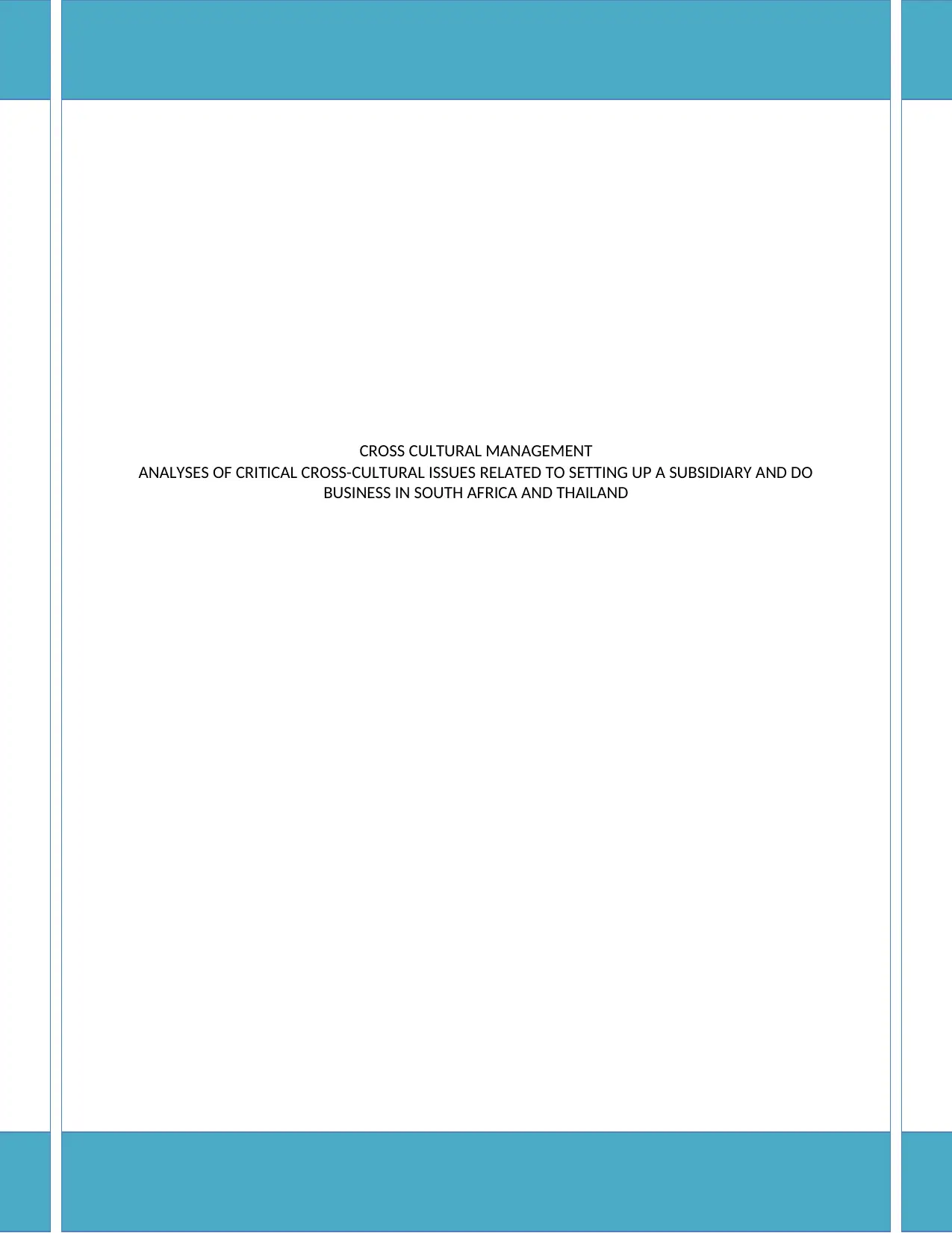
CROSS CULTURAL MANAGEMENT
ANALYSES OF CRITICAL CROSS-CULTURAL ISSUES RELATED TO SETTING UP A SUBSIDIARY AND DO
BUSINESS IN SOUTH AFRICA AND THAILAND
ANALYSES OF CRITICAL CROSS-CULTURAL ISSUES RELATED TO SETTING UP A SUBSIDIARY AND DO
BUSINESS IN SOUTH AFRICA AND THAILAND
Paraphrase This Document
Need a fresh take? Get an instant paraphrase of this document with our AI Paraphraser
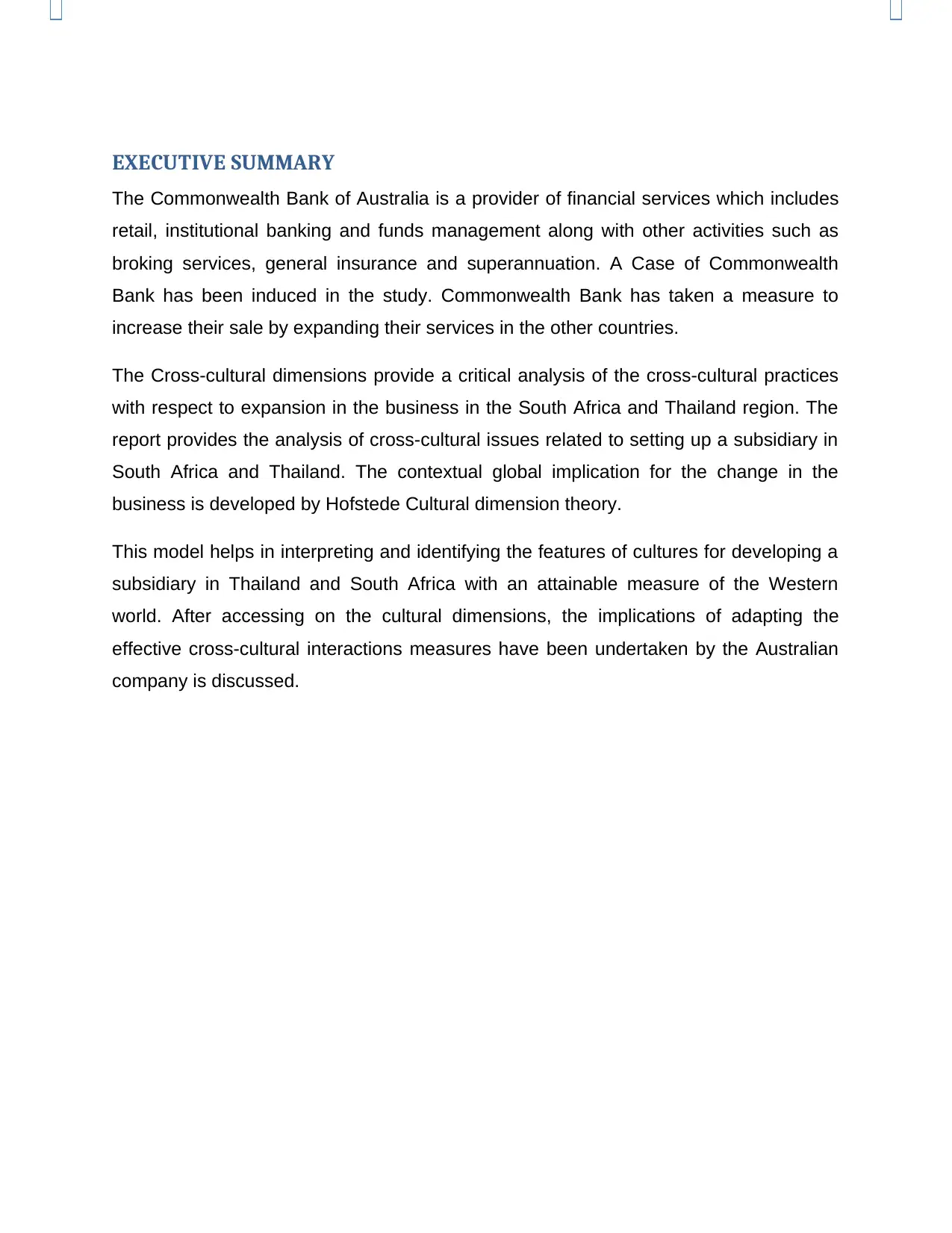
EXECUTIVE SUMMARY
The Commonwealth Bank of Australia is a provider of financial services which includes
retail, institutional banking and funds management along with other activities such as
broking services, general insurance and superannuation. A Case of Commonwealth
Bank has been induced in the study. Commonwealth Bank has taken a measure to
increase their sale by expanding their services in the other countries.
The Cross-cultural dimensions provide a critical analysis of the cross-cultural practices
with respect to expansion in the business in the South Africa and Thailand region. The
report provides the analysis of cross-cultural issues related to setting up a subsidiary in
South Africa and Thailand. The contextual global implication for the change in the
business is developed by Hofstede Cultural dimension theory.
This model helps in interpreting and identifying the features of cultures for developing a
subsidiary in Thailand and South Africa with an attainable measure of the Western
world. After accessing on the cultural dimensions, the implications of adapting the
effective cross-cultural interactions measures have been undertaken by the Australian
company is discussed.
The Commonwealth Bank of Australia is a provider of financial services which includes
retail, institutional banking and funds management along with other activities such as
broking services, general insurance and superannuation. A Case of Commonwealth
Bank has been induced in the study. Commonwealth Bank has taken a measure to
increase their sale by expanding their services in the other countries.
The Cross-cultural dimensions provide a critical analysis of the cross-cultural practices
with respect to expansion in the business in the South Africa and Thailand region. The
report provides the analysis of cross-cultural issues related to setting up a subsidiary in
South Africa and Thailand. The contextual global implication for the change in the
business is developed by Hofstede Cultural dimension theory.
This model helps in interpreting and identifying the features of cultures for developing a
subsidiary in Thailand and South Africa with an attainable measure of the Western
world. After accessing on the cultural dimensions, the implications of adapting the
effective cross-cultural interactions measures have been undertaken by the Australian
company is discussed.
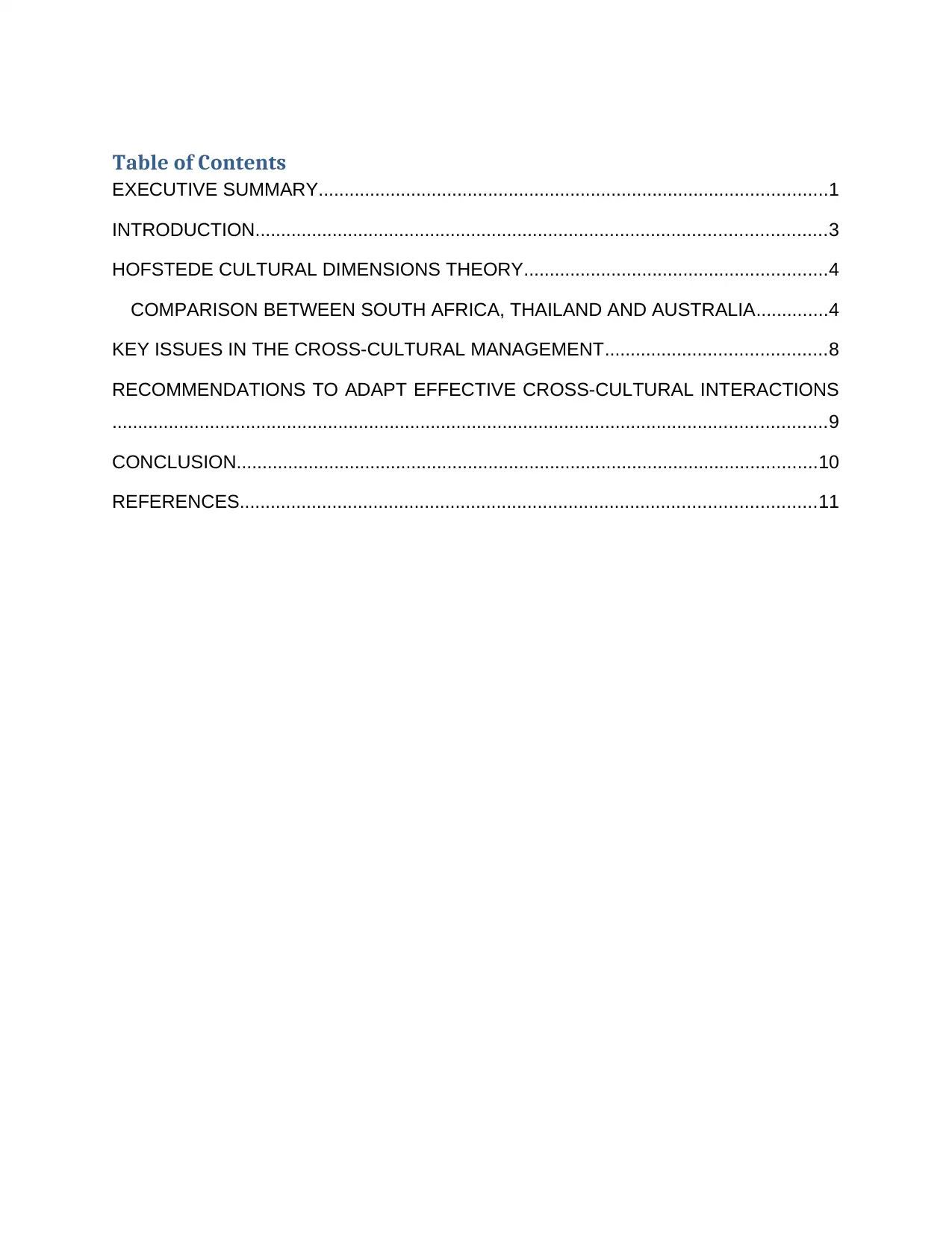
Table of Contents
EXECUTIVE SUMMARY...................................................................................................1
INTRODUCTION...............................................................................................................3
HOFSTEDE CULTURAL DIMENSIONS THEORY...........................................................4
COMPARISON BETWEEN SOUTH AFRICA, THAILAND AND AUSTRALIA..............4
KEY ISSUES IN THE CROSS-CULTURAL MANAGEMENT...........................................8
RECOMMENDATIONS TO ADAPT EFFECTIVE CROSS-CULTURAL INTERACTIONS
...........................................................................................................................................9
CONCLUSION.................................................................................................................10
REFERENCES................................................................................................................11
EXECUTIVE SUMMARY...................................................................................................1
INTRODUCTION...............................................................................................................3
HOFSTEDE CULTURAL DIMENSIONS THEORY...........................................................4
COMPARISON BETWEEN SOUTH AFRICA, THAILAND AND AUSTRALIA..............4
KEY ISSUES IN THE CROSS-CULTURAL MANAGEMENT...........................................8
RECOMMENDATIONS TO ADAPT EFFECTIVE CROSS-CULTURAL INTERACTIONS
...........................................................................................................................................9
CONCLUSION.................................................................................................................10
REFERENCES................................................................................................................11
⊘ This is a preview!⊘
Do you want full access?
Subscribe today to unlock all pages.

Trusted by 1+ million students worldwide
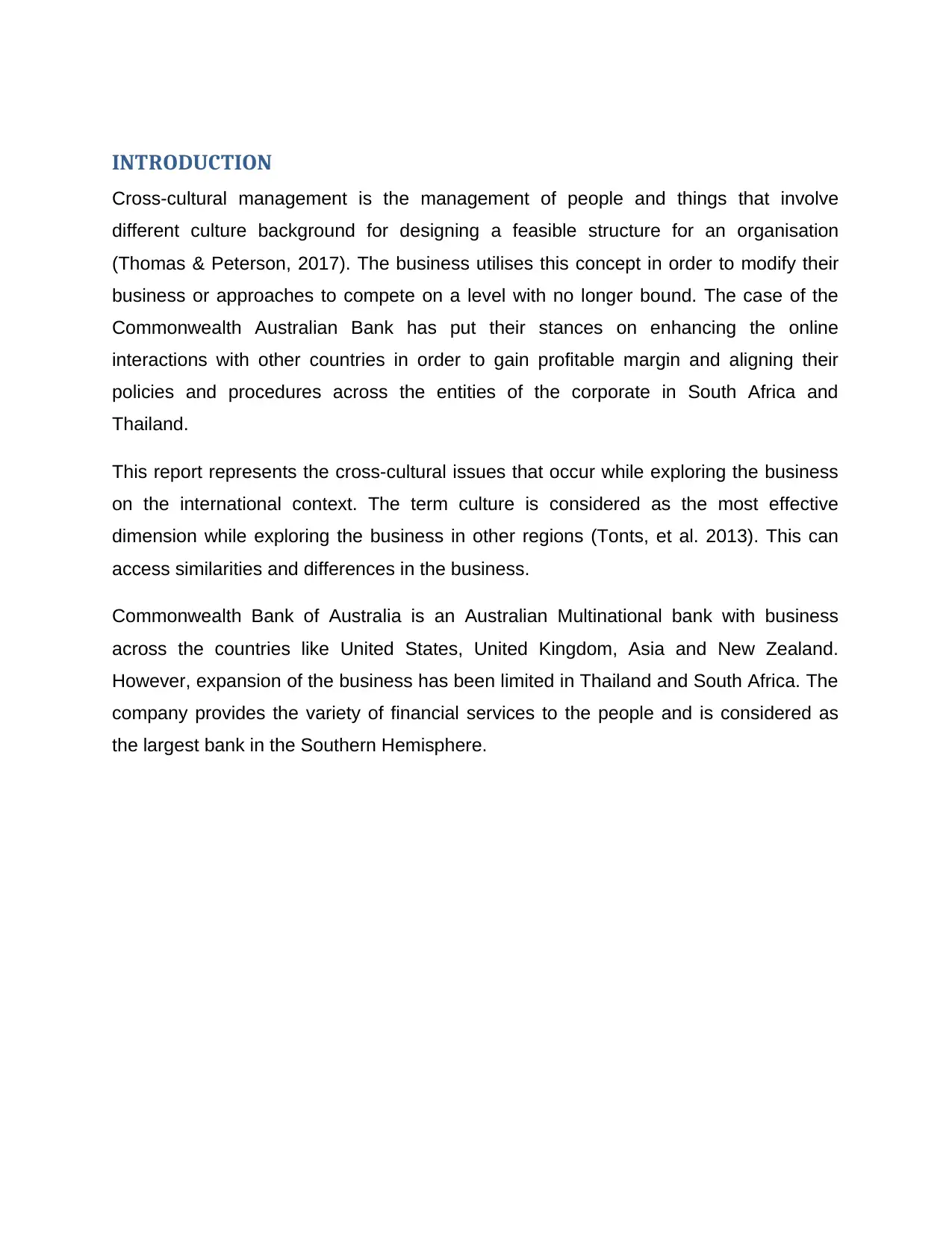
INTRODUCTION
Cross-cultural management is the management of people and things that involve
different culture background for designing a feasible structure for an organisation
(Thomas & Peterson, 2017). The business utilises this concept in order to modify their
business or approaches to compete on a level with no longer bound. The case of the
Commonwealth Australian Bank has put their stances on enhancing the online
interactions with other countries in order to gain profitable margin and aligning their
policies and procedures across the entities of the corporate in South Africa and
Thailand.
This report represents the cross-cultural issues that occur while exploring the business
on the international context. The term culture is considered as the most effective
dimension while exploring the business in other regions (Tonts, et al. 2013). This can
access similarities and differences in the business.
Commonwealth Bank of Australia is an Australian Multinational bank with business
across the countries like United States, United Kingdom, Asia and New Zealand.
However, expansion of the business has been limited in Thailand and South Africa. The
company provides the variety of financial services to the people and is considered as
the largest bank in the Southern Hemisphere.
Cross-cultural management is the management of people and things that involve
different culture background for designing a feasible structure for an organisation
(Thomas & Peterson, 2017). The business utilises this concept in order to modify their
business or approaches to compete on a level with no longer bound. The case of the
Commonwealth Australian Bank has put their stances on enhancing the online
interactions with other countries in order to gain profitable margin and aligning their
policies and procedures across the entities of the corporate in South Africa and
Thailand.
This report represents the cross-cultural issues that occur while exploring the business
on the international context. The term culture is considered as the most effective
dimension while exploring the business in other regions (Tonts, et al. 2013). This can
access similarities and differences in the business.
Commonwealth Bank of Australia is an Australian Multinational bank with business
across the countries like United States, United Kingdom, Asia and New Zealand.
However, expansion of the business has been limited in Thailand and South Africa. The
company provides the variety of financial services to the people and is considered as
the largest bank in the Southern Hemisphere.
Paraphrase This Document
Need a fresh take? Get an instant paraphrase of this document with our AI Paraphraser
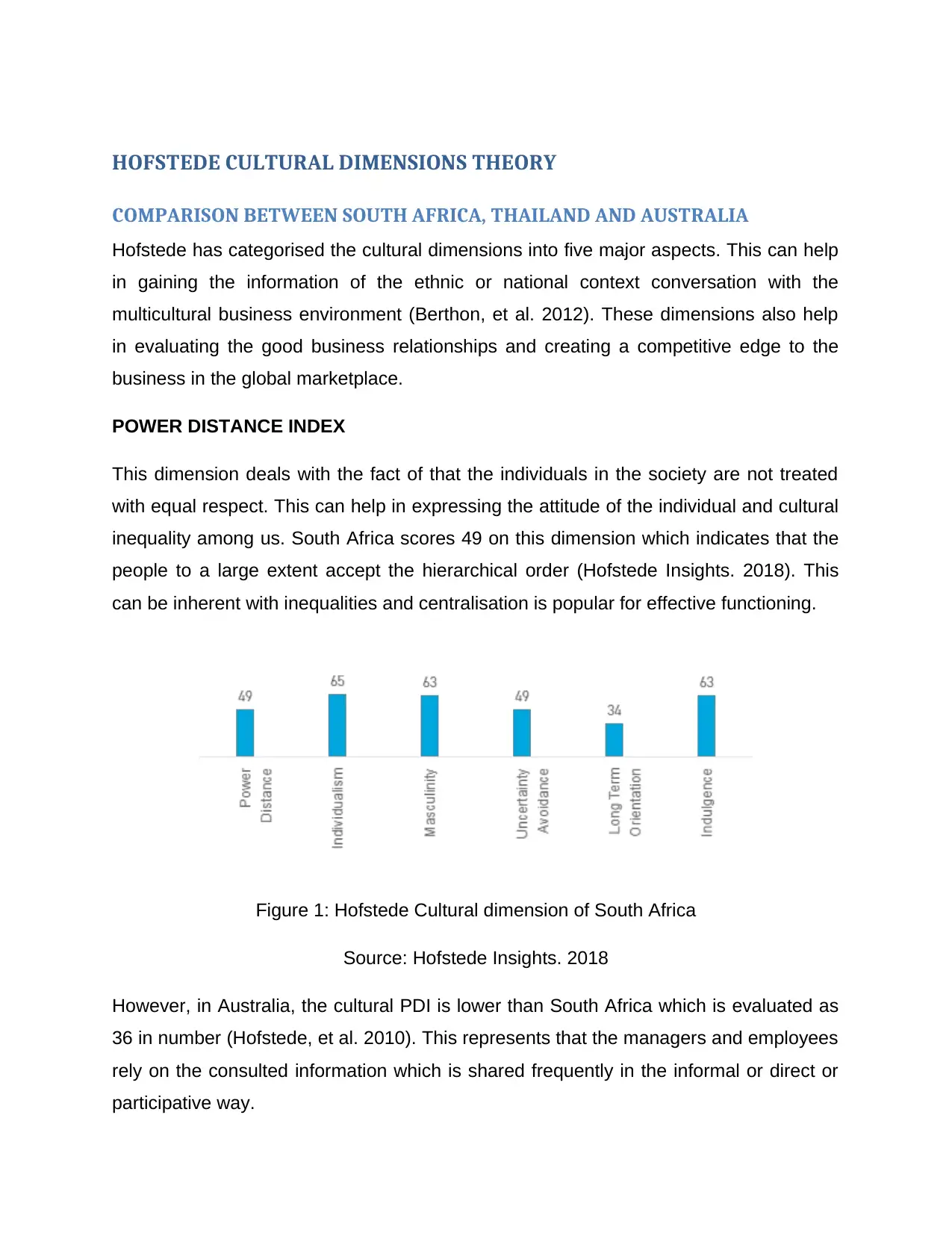
HOFSTEDE CULTURAL DIMENSIONS THEORY
COMPARISON BETWEEN SOUTH AFRICA, THAILAND AND AUSTRALIA
Hofstede has categorised the cultural dimensions into five major aspects. This can help
in gaining the information of the ethnic or national context conversation with the
multicultural business environment (Berthon, et al. 2012). These dimensions also help
in evaluating the good business relationships and creating a competitive edge to the
business in the global marketplace.
POWER DISTANCE INDEX
This dimension deals with the fact of that the individuals in the society are not treated
with equal respect. This can help in expressing the attitude of the individual and cultural
inequality among us. South Africa scores 49 on this dimension which indicates that the
people to a large extent accept the hierarchical order (Hofstede Insights. 2018). This
can be inherent with inequalities and centralisation is popular for effective functioning.
Figure 1: Hofstede Cultural dimension of South Africa
Source: Hofstede Insights. 2018
However, in Australia, the cultural PDI is lower than South Africa which is evaluated as
36 in number (Hofstede, et al. 2010). This represents that the managers and employees
rely on the consulted information which is shared frequently in the informal or direct or
participative way.
COMPARISON BETWEEN SOUTH AFRICA, THAILAND AND AUSTRALIA
Hofstede has categorised the cultural dimensions into five major aspects. This can help
in gaining the information of the ethnic or national context conversation with the
multicultural business environment (Berthon, et al. 2012). These dimensions also help
in evaluating the good business relationships and creating a competitive edge to the
business in the global marketplace.
POWER DISTANCE INDEX
This dimension deals with the fact of that the individuals in the society are not treated
with equal respect. This can help in expressing the attitude of the individual and cultural
inequality among us. South Africa scores 49 on this dimension which indicates that the
people to a large extent accept the hierarchical order (Hofstede Insights. 2018). This
can be inherent with inequalities and centralisation is popular for effective functioning.
Figure 1: Hofstede Cultural dimension of South Africa
Source: Hofstede Insights. 2018
However, in Australia, the cultural PDI is lower than South Africa which is evaluated as
36 in number (Hofstede, et al. 2010). This represents that the managers and employees
rely on the consulted information which is shared frequently in the informal or direct or
participative way.
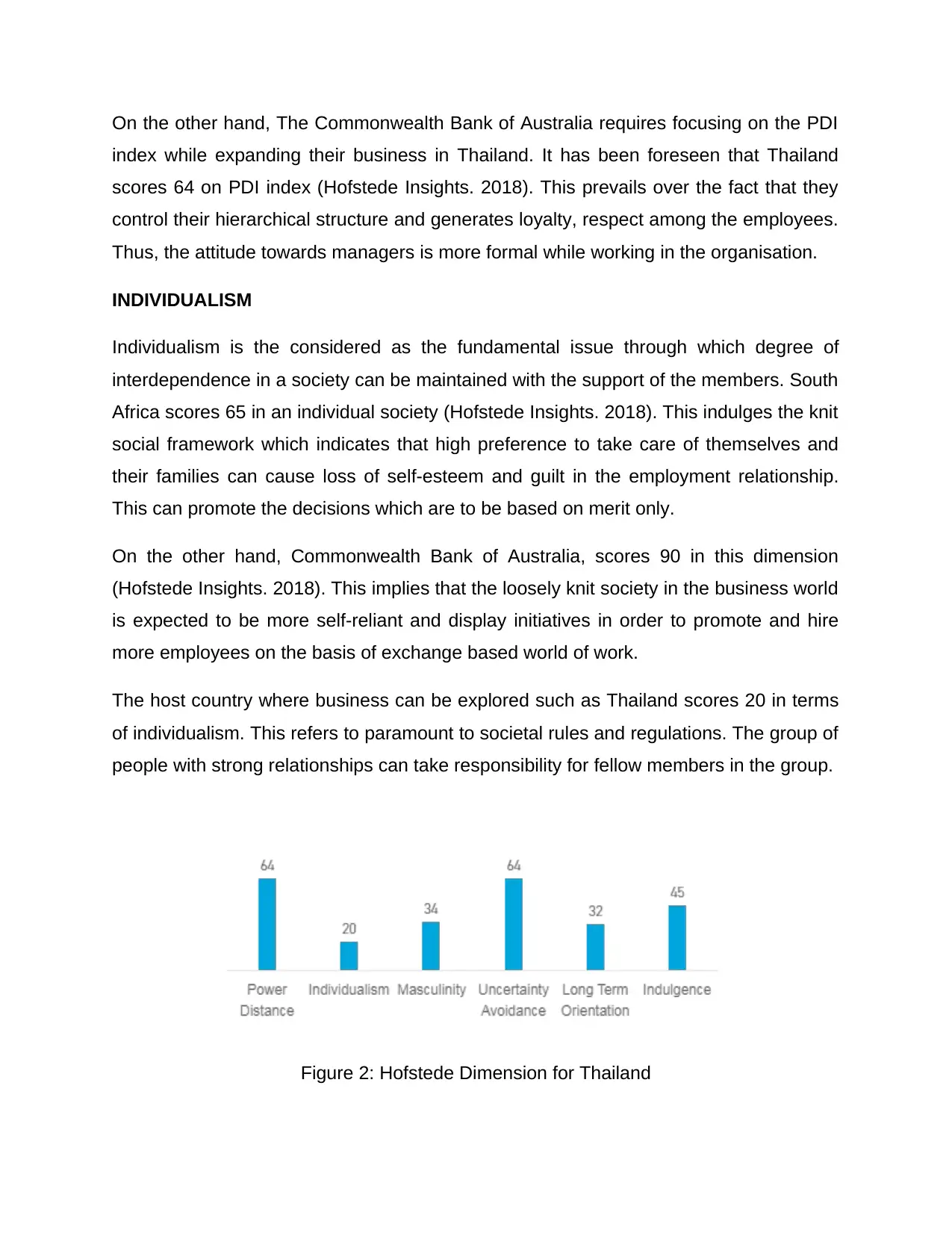
On the other hand, The Commonwealth Bank of Australia requires focusing on the PDI
index while expanding their business in Thailand. It has been foreseen that Thailand
scores 64 on PDI index (Hofstede Insights. 2018). This prevails over the fact that they
control their hierarchical structure and generates loyalty, respect among the employees.
Thus, the attitude towards managers is more formal while working in the organisation.
INDIVIDUALISM
Individualism is the considered as the fundamental issue through which degree of
interdependence in a society can be maintained with the support of the members. South
Africa scores 65 in an individual society (Hofstede Insights. 2018). This indulges the knit
social framework which indicates that high preference to take care of themselves and
their families can cause loss of self-esteem and guilt in the employment relationship.
This can promote the decisions which are to be based on merit only.
On the other hand, Commonwealth Bank of Australia, scores 90 in this dimension
(Hofstede Insights. 2018). This implies that the loosely knit society in the business world
is expected to be more self-reliant and display initiatives in order to promote and hire
more employees on the basis of exchange based world of work.
The host country where business can be explored such as Thailand scores 20 in terms
of individualism. This refers to paramount to societal rules and regulations. The group of
people with strong relationships can take responsibility for fellow members in the group.
Figure 2: Hofstede Dimension for Thailand
index while expanding their business in Thailand. It has been foreseen that Thailand
scores 64 on PDI index (Hofstede Insights. 2018). This prevails over the fact that they
control their hierarchical structure and generates loyalty, respect among the employees.
Thus, the attitude towards managers is more formal while working in the organisation.
INDIVIDUALISM
Individualism is the considered as the fundamental issue through which degree of
interdependence in a society can be maintained with the support of the members. South
Africa scores 65 in an individual society (Hofstede Insights. 2018). This indulges the knit
social framework which indicates that high preference to take care of themselves and
their families can cause loss of self-esteem and guilt in the employment relationship.
This can promote the decisions which are to be based on merit only.
On the other hand, Commonwealth Bank of Australia, scores 90 in this dimension
(Hofstede Insights. 2018). This implies that the loosely knit society in the business world
is expected to be more self-reliant and display initiatives in order to promote and hire
more employees on the basis of exchange based world of work.
The host country where business can be explored such as Thailand scores 20 in terms
of individualism. This refers to paramount to societal rules and regulations. The group of
people with strong relationships can take responsibility for fellow members in the group.
Figure 2: Hofstede Dimension for Thailand
⊘ This is a preview!⊘
Do you want full access?
Subscribe today to unlock all pages.

Trusted by 1+ million students worldwide
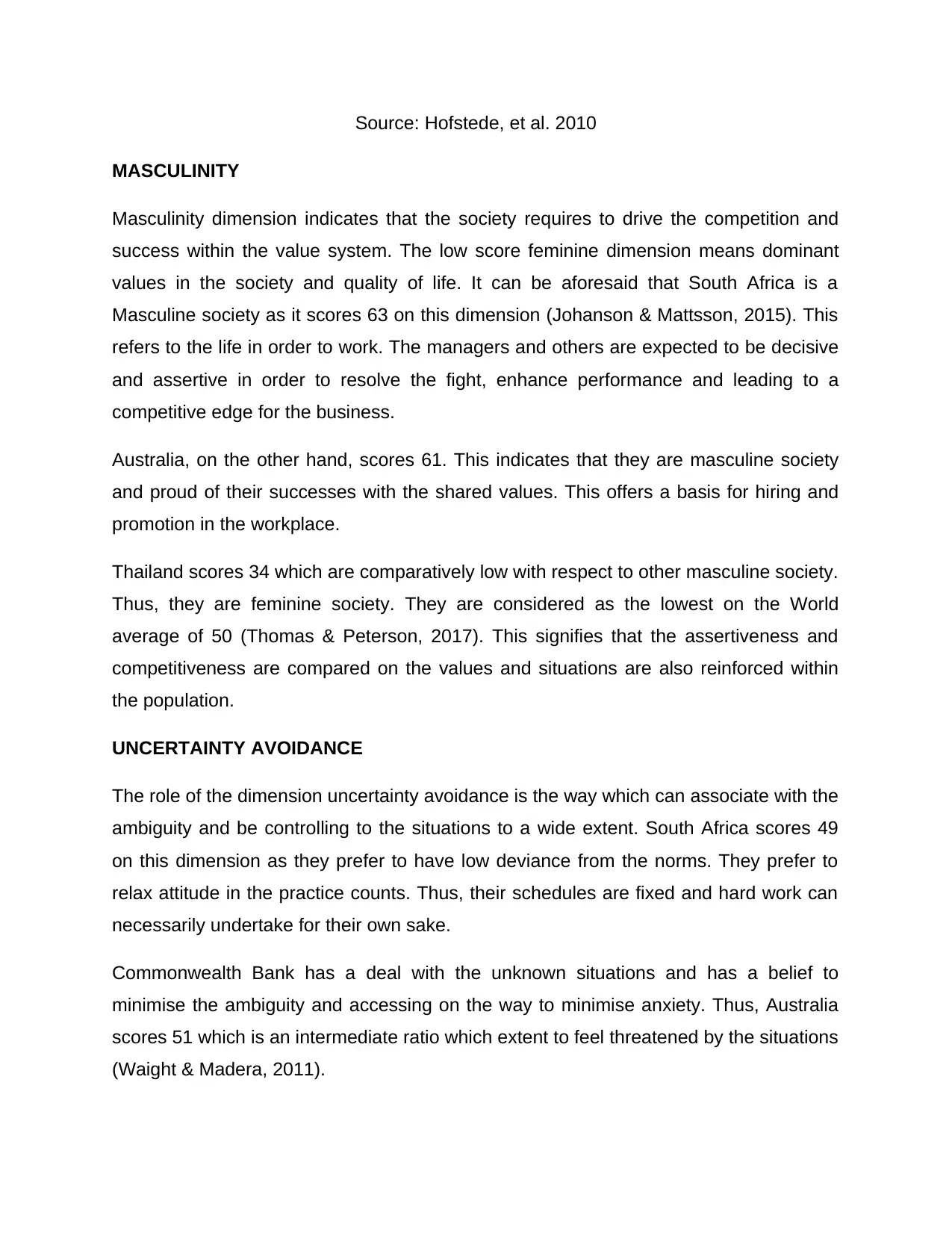
Source: Hofstede, et al. 2010
MASCULINITY
Masculinity dimension indicates that the society requires to drive the competition and
success within the value system. The low score feminine dimension means dominant
values in the society and quality of life. It can be aforesaid that South Africa is a
Masculine society as it scores 63 on this dimension (Johanson & Mattsson, 2015). This
refers to the life in order to work. The managers and others are expected to be decisive
and assertive in order to resolve the fight, enhance performance and leading to a
competitive edge for the business.
Australia, on the other hand, scores 61. This indicates that they are masculine society
and proud of their successes with the shared values. This offers a basis for hiring and
promotion in the workplace.
Thailand scores 34 which are comparatively low with respect to other masculine society.
Thus, they are feminine society. They are considered as the lowest on the World
average of 50 (Thomas & Peterson, 2017). This signifies that the assertiveness and
competitiveness are compared on the values and situations are also reinforced within
the population.
UNCERTAINTY AVOIDANCE
The role of the dimension uncertainty avoidance is the way which can associate with the
ambiguity and be controlling to the situations to a wide extent. South Africa scores 49
on this dimension as they prefer to have low deviance from the norms. They prefer to
relax attitude in the practice counts. Thus, their schedules are fixed and hard work can
necessarily undertake for their own sake.
Commonwealth Bank has a deal with the unknown situations and has a belief to
minimise the ambiguity and accessing on the way to minimise anxiety. Thus, Australia
scores 51 which is an intermediate ratio which extent to feel threatened by the situations
(Waight & Madera, 2011).
MASCULINITY
Masculinity dimension indicates that the society requires to drive the competition and
success within the value system. The low score feminine dimension means dominant
values in the society and quality of life. It can be aforesaid that South Africa is a
Masculine society as it scores 63 on this dimension (Johanson & Mattsson, 2015). This
refers to the life in order to work. The managers and others are expected to be decisive
and assertive in order to resolve the fight, enhance performance and leading to a
competitive edge for the business.
Australia, on the other hand, scores 61. This indicates that they are masculine society
and proud of their successes with the shared values. This offers a basis for hiring and
promotion in the workplace.
Thailand scores 34 which are comparatively low with respect to other masculine society.
Thus, they are feminine society. They are considered as the lowest on the World
average of 50 (Thomas & Peterson, 2017). This signifies that the assertiveness and
competitiveness are compared on the values and situations are also reinforced within
the population.
UNCERTAINTY AVOIDANCE
The role of the dimension uncertainty avoidance is the way which can associate with the
ambiguity and be controlling to the situations to a wide extent. South Africa scores 49
on this dimension as they prefer to have low deviance from the norms. They prefer to
relax attitude in the practice counts. Thus, their schedules are fixed and hard work can
necessarily undertake for their own sake.
Commonwealth Bank has a deal with the unknown situations and has a belief to
minimise the ambiguity and accessing on the way to minimise anxiety. Thus, Australia
scores 51 which is an intermediate ratio which extent to feel threatened by the situations
(Waight & Madera, 2011).
Paraphrase This Document
Need a fresh take? Get an instant paraphrase of this document with our AI Paraphraser
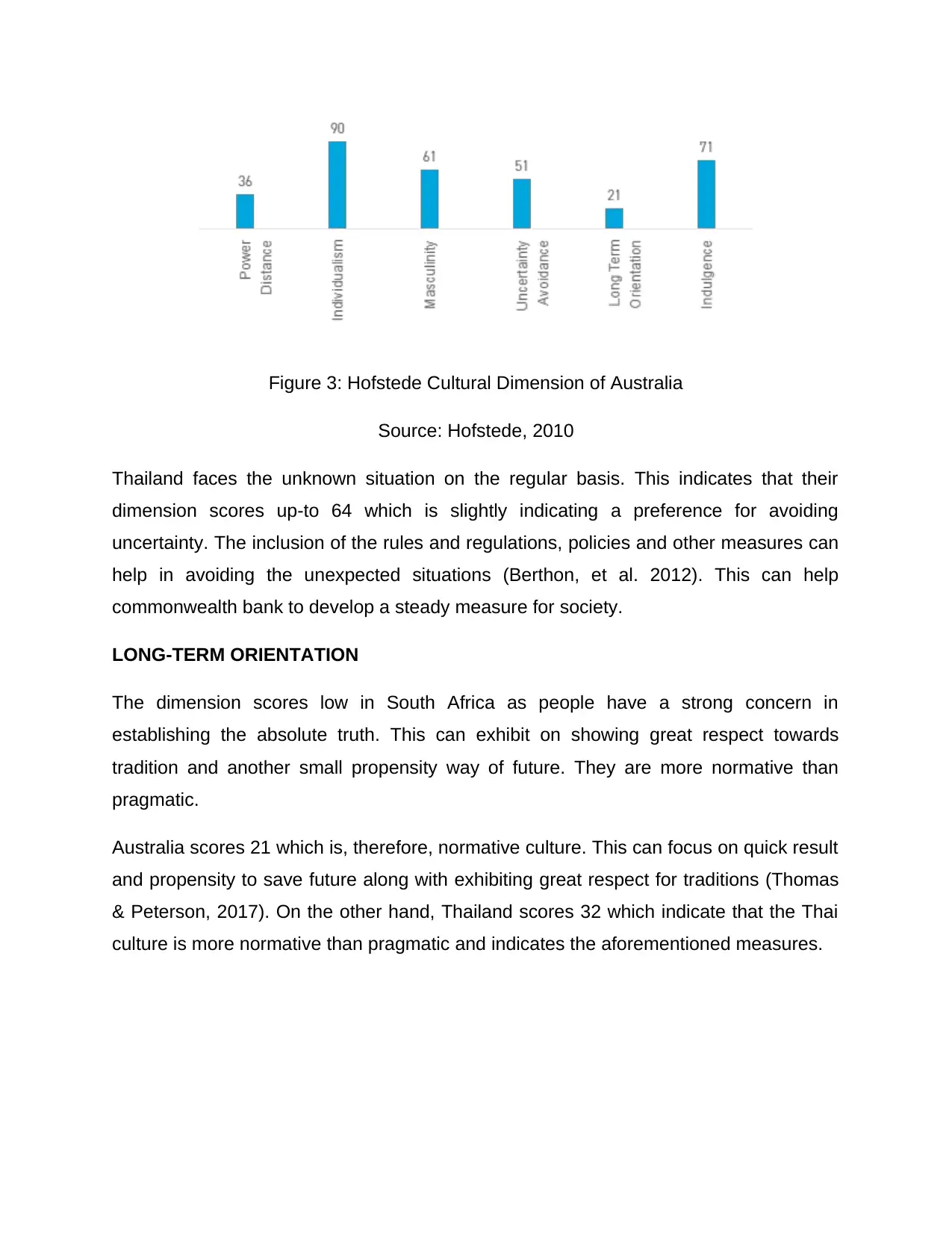
Figure 3: Hofstede Cultural Dimension of Australia
Source: Hofstede, 2010
Thailand faces the unknown situation on the regular basis. This indicates that their
dimension scores up-to 64 which is slightly indicating a preference for avoiding
uncertainty. The inclusion of the rules and regulations, policies and other measures can
help in avoiding the unexpected situations (Berthon, et al. 2012). This can help
commonwealth bank to develop a steady measure for society.
LONG-TERM ORIENTATION
The dimension scores low in South Africa as people have a strong concern in
establishing the absolute truth. This can exhibit on showing great respect towards
tradition and another small propensity way of future. They are more normative than
pragmatic.
Australia scores 21 which is, therefore, normative culture. This can focus on quick result
and propensity to save future along with exhibiting great respect for traditions (Thomas
& Peterson, 2017). On the other hand, Thailand scores 32 which indicate that the Thai
culture is more normative than pragmatic and indicates the aforementioned measures.
Source: Hofstede, 2010
Thailand faces the unknown situation on the regular basis. This indicates that their
dimension scores up-to 64 which is slightly indicating a preference for avoiding
uncertainty. The inclusion of the rules and regulations, policies and other measures can
help in avoiding the unexpected situations (Berthon, et al. 2012). This can help
commonwealth bank to develop a steady measure for society.
LONG-TERM ORIENTATION
The dimension scores low in South Africa as people have a strong concern in
establishing the absolute truth. This can exhibit on showing great respect towards
tradition and another small propensity way of future. They are more normative than
pragmatic.
Australia scores 21 which is, therefore, normative culture. This can focus on quick result
and propensity to save future along with exhibiting great respect for traditions (Thomas
& Peterson, 2017). On the other hand, Thailand scores 32 which indicate that the Thai
culture is more normative than pragmatic and indicates the aforementioned measures.
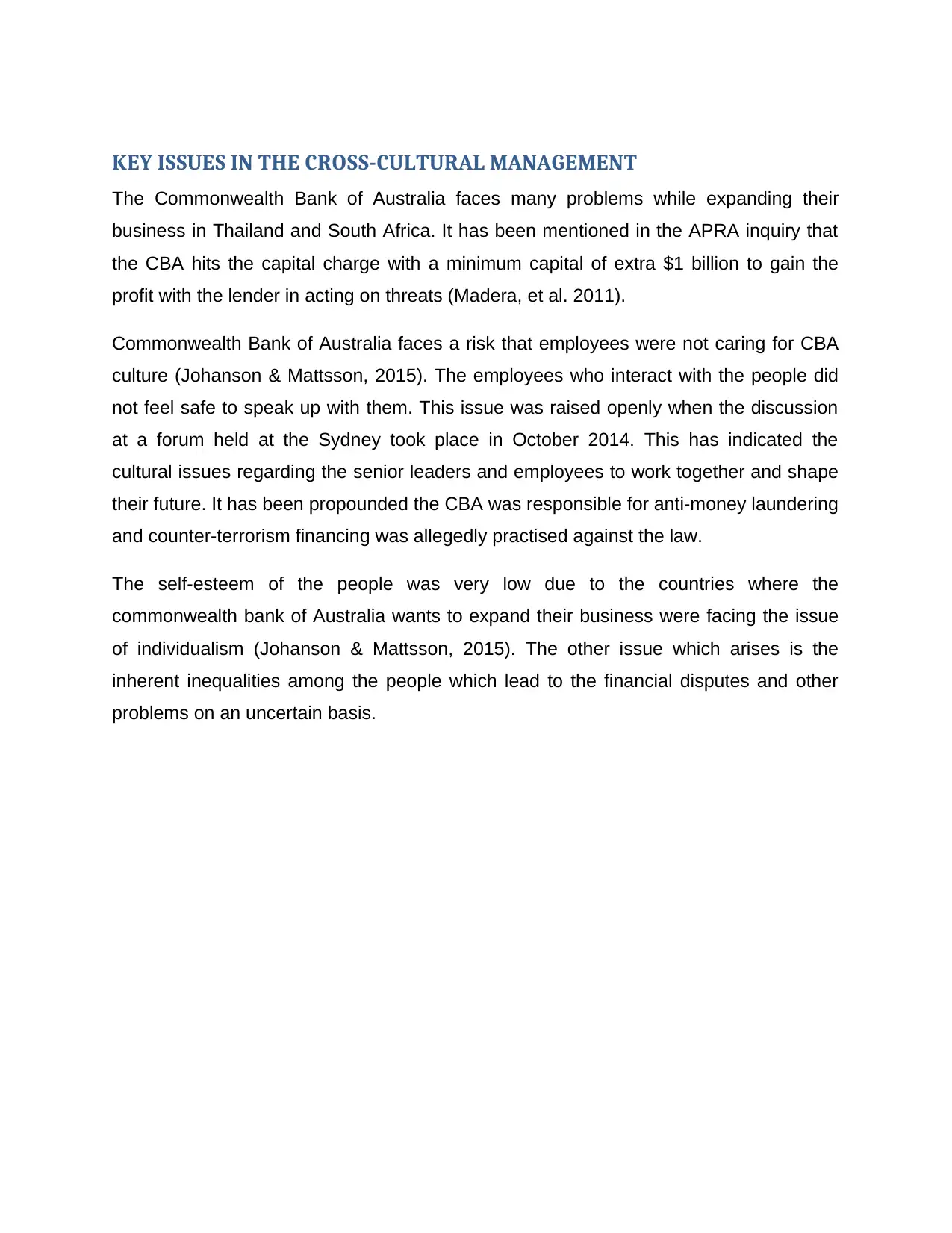
KEY ISSUES IN THE CROSS-CULTURAL MANAGEMENT
The Commonwealth Bank of Australia faces many problems while expanding their
business in Thailand and South Africa. It has been mentioned in the APRA inquiry that
the CBA hits the capital charge with a minimum capital of extra $1 billion to gain the
profit with the lender in acting on threats (Madera, et al. 2011).
Commonwealth Bank of Australia faces a risk that employees were not caring for CBA
culture (Johanson & Mattsson, 2015). The employees who interact with the people did
not feel safe to speak up with them. This issue was raised openly when the discussion
at a forum held at the Sydney took place in October 2014. This has indicated the
cultural issues regarding the senior leaders and employees to work together and shape
their future. It has been propounded the CBA was responsible for anti-money laundering
and counter-terrorism financing was allegedly practised against the law.
The self-esteem of the people was very low due to the countries where the
commonwealth bank of Australia wants to expand their business were facing the issue
of individualism (Johanson & Mattsson, 2015). The other issue which arises is the
inherent inequalities among the people which lead to the financial disputes and other
problems on an uncertain basis.
The Commonwealth Bank of Australia faces many problems while expanding their
business in Thailand and South Africa. It has been mentioned in the APRA inquiry that
the CBA hits the capital charge with a minimum capital of extra $1 billion to gain the
profit with the lender in acting on threats (Madera, et al. 2011).
Commonwealth Bank of Australia faces a risk that employees were not caring for CBA
culture (Johanson & Mattsson, 2015). The employees who interact with the people did
not feel safe to speak up with them. This issue was raised openly when the discussion
at a forum held at the Sydney took place in October 2014. This has indicated the
cultural issues regarding the senior leaders and employees to work together and shape
their future. It has been propounded the CBA was responsible for anti-money laundering
and counter-terrorism financing was allegedly practised against the law.
The self-esteem of the people was very low due to the countries where the
commonwealth bank of Australia wants to expand their business were facing the issue
of individualism (Johanson & Mattsson, 2015). The other issue which arises is the
inherent inequalities among the people which lead to the financial disputes and other
problems on an uncertain basis.
⊘ This is a preview!⊘
Do you want full access?
Subscribe today to unlock all pages.

Trusted by 1+ million students worldwide
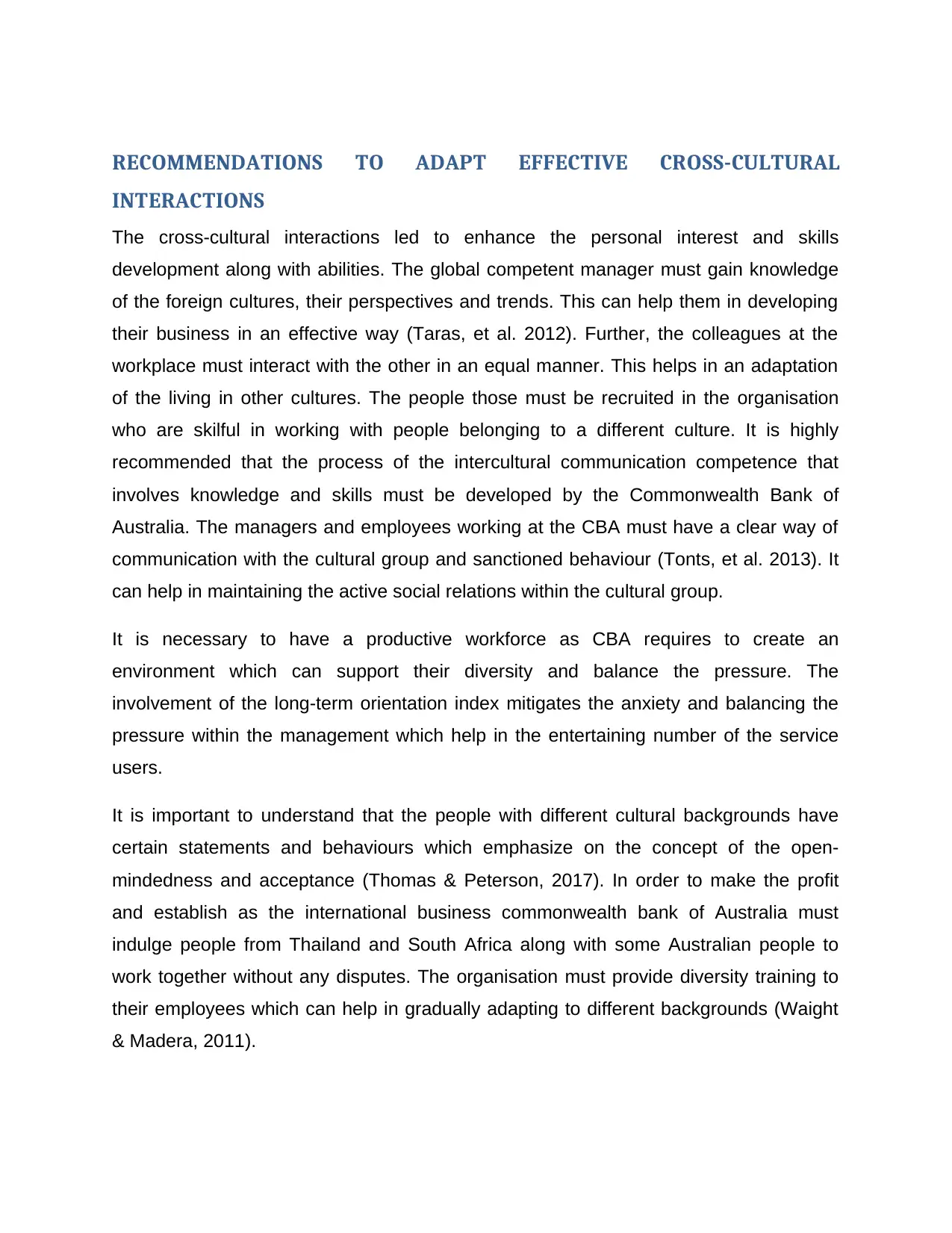
RECOMMENDATIONS TO ADAPT EFFECTIVE CROSS-CULTURAL
INTERACTIONS
The cross-cultural interactions led to enhance the personal interest and skills
development along with abilities. The global competent manager must gain knowledge
of the foreign cultures, their perspectives and trends. This can help them in developing
their business in an effective way (Taras, et al. 2012). Further, the colleagues at the
workplace must interact with the other in an equal manner. This helps in an adaptation
of the living in other cultures. The people those must be recruited in the organisation
who are skilful in working with people belonging to a different culture. It is highly
recommended that the process of the intercultural communication competence that
involves knowledge and skills must be developed by the Commonwealth Bank of
Australia. The managers and employees working at the CBA must have a clear way of
communication with the cultural group and sanctioned behaviour (Tonts, et al. 2013). It
can help in maintaining the active social relations within the cultural group.
It is necessary to have a productive workforce as CBA requires to create an
environment which can support their diversity and balance the pressure. The
involvement of the long-term orientation index mitigates the anxiety and balancing the
pressure within the management which help in the entertaining number of the service
users.
It is important to understand that the people with different cultural backgrounds have
certain statements and behaviours which emphasize on the concept of the open-
mindedness and acceptance (Thomas & Peterson, 2017). In order to make the profit
and establish as the international business commonwealth bank of Australia must
indulge people from Thailand and South Africa along with some Australian people to
work together without any disputes. The organisation must provide diversity training to
their employees which can help in gradually adapting to different backgrounds (Waight
& Madera, 2011).
INTERACTIONS
The cross-cultural interactions led to enhance the personal interest and skills
development along with abilities. The global competent manager must gain knowledge
of the foreign cultures, their perspectives and trends. This can help them in developing
their business in an effective way (Taras, et al. 2012). Further, the colleagues at the
workplace must interact with the other in an equal manner. This helps in an adaptation
of the living in other cultures. The people those must be recruited in the organisation
who are skilful in working with people belonging to a different culture. It is highly
recommended that the process of the intercultural communication competence that
involves knowledge and skills must be developed by the Commonwealth Bank of
Australia. The managers and employees working at the CBA must have a clear way of
communication with the cultural group and sanctioned behaviour (Tonts, et al. 2013). It
can help in maintaining the active social relations within the cultural group.
It is necessary to have a productive workforce as CBA requires to create an
environment which can support their diversity and balance the pressure. The
involvement of the long-term orientation index mitigates the anxiety and balancing the
pressure within the management which help in the entertaining number of the service
users.
It is important to understand that the people with different cultural backgrounds have
certain statements and behaviours which emphasize on the concept of the open-
mindedness and acceptance (Thomas & Peterson, 2017). In order to make the profit
and establish as the international business commonwealth bank of Australia must
indulge people from Thailand and South Africa along with some Australian people to
work together without any disputes. The organisation must provide diversity training to
their employees which can help in gradually adapting to different backgrounds (Waight
& Madera, 2011).
Paraphrase This Document
Need a fresh take? Get an instant paraphrase of this document with our AI Paraphraser
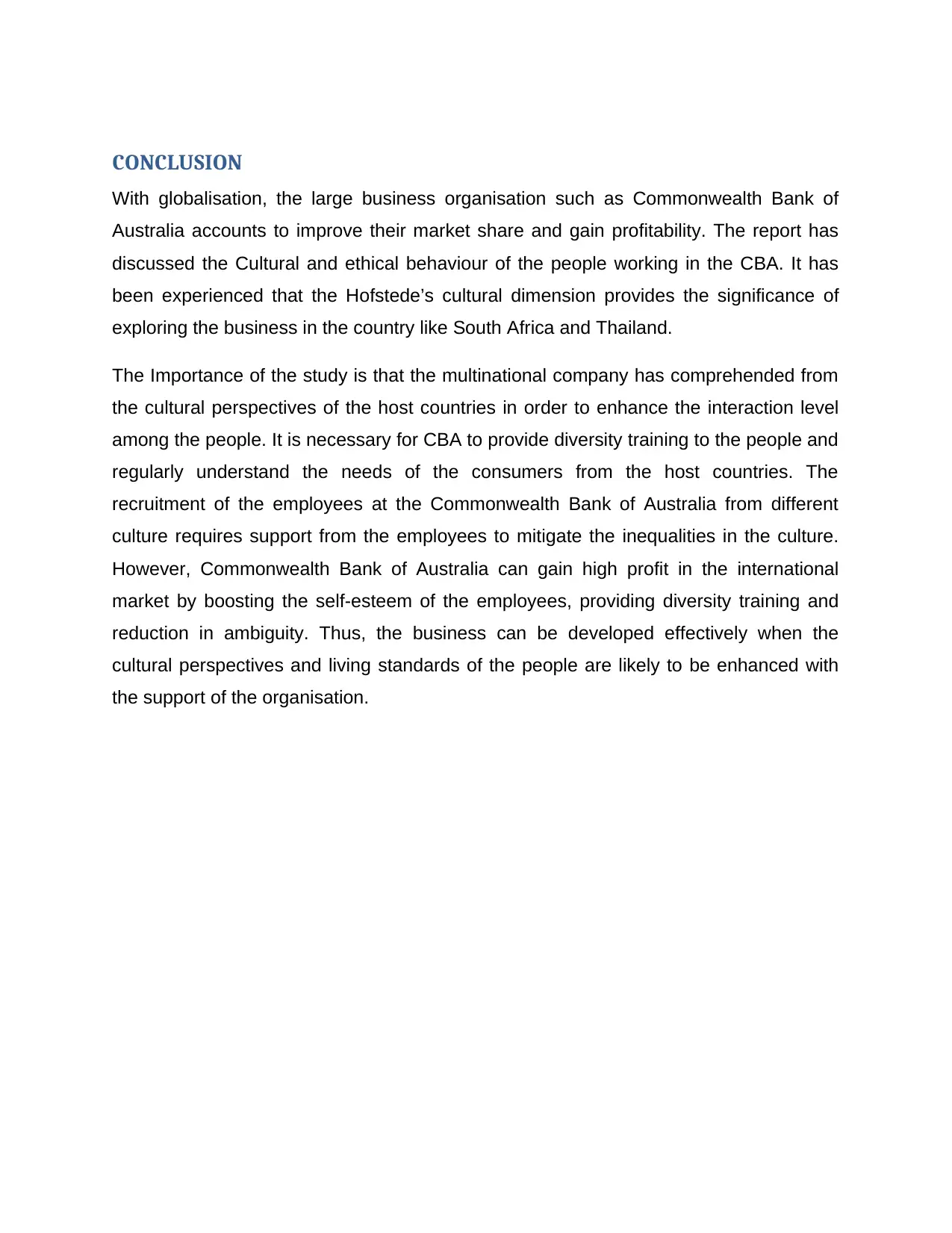
CONCLUSION
With globalisation, the large business organisation such as Commonwealth Bank of
Australia accounts to improve their market share and gain profitability. The report has
discussed the Cultural and ethical behaviour of the people working in the CBA. It has
been experienced that the Hofstede’s cultural dimension provides the significance of
exploring the business in the country like South Africa and Thailand.
The Importance of the study is that the multinational company has comprehended from
the cultural perspectives of the host countries in order to enhance the interaction level
among the people. It is necessary for CBA to provide diversity training to the people and
regularly understand the needs of the consumers from the host countries. The
recruitment of the employees at the Commonwealth Bank of Australia from different
culture requires support from the employees to mitigate the inequalities in the culture.
However, Commonwealth Bank of Australia can gain high profit in the international
market by boosting the self-esteem of the employees, providing diversity training and
reduction in ambiguity. Thus, the business can be developed effectively when the
cultural perspectives and living standards of the people are likely to be enhanced with
the support of the organisation.
With globalisation, the large business organisation such as Commonwealth Bank of
Australia accounts to improve their market share and gain profitability. The report has
discussed the Cultural and ethical behaviour of the people working in the CBA. It has
been experienced that the Hofstede’s cultural dimension provides the significance of
exploring the business in the country like South Africa and Thailand.
The Importance of the study is that the multinational company has comprehended from
the cultural perspectives of the host countries in order to enhance the interaction level
among the people. It is necessary for CBA to provide diversity training to the people and
regularly understand the needs of the consumers from the host countries. The
recruitment of the employees at the Commonwealth Bank of Australia from different
culture requires support from the employees to mitigate the inequalities in the culture.
However, Commonwealth Bank of Australia can gain high profit in the international
market by boosting the self-esteem of the employees, providing diversity training and
reduction in ambiguity. Thus, the business can be developed effectively when the
cultural perspectives and living standards of the people are likely to be enhanced with
the support of the organisation.
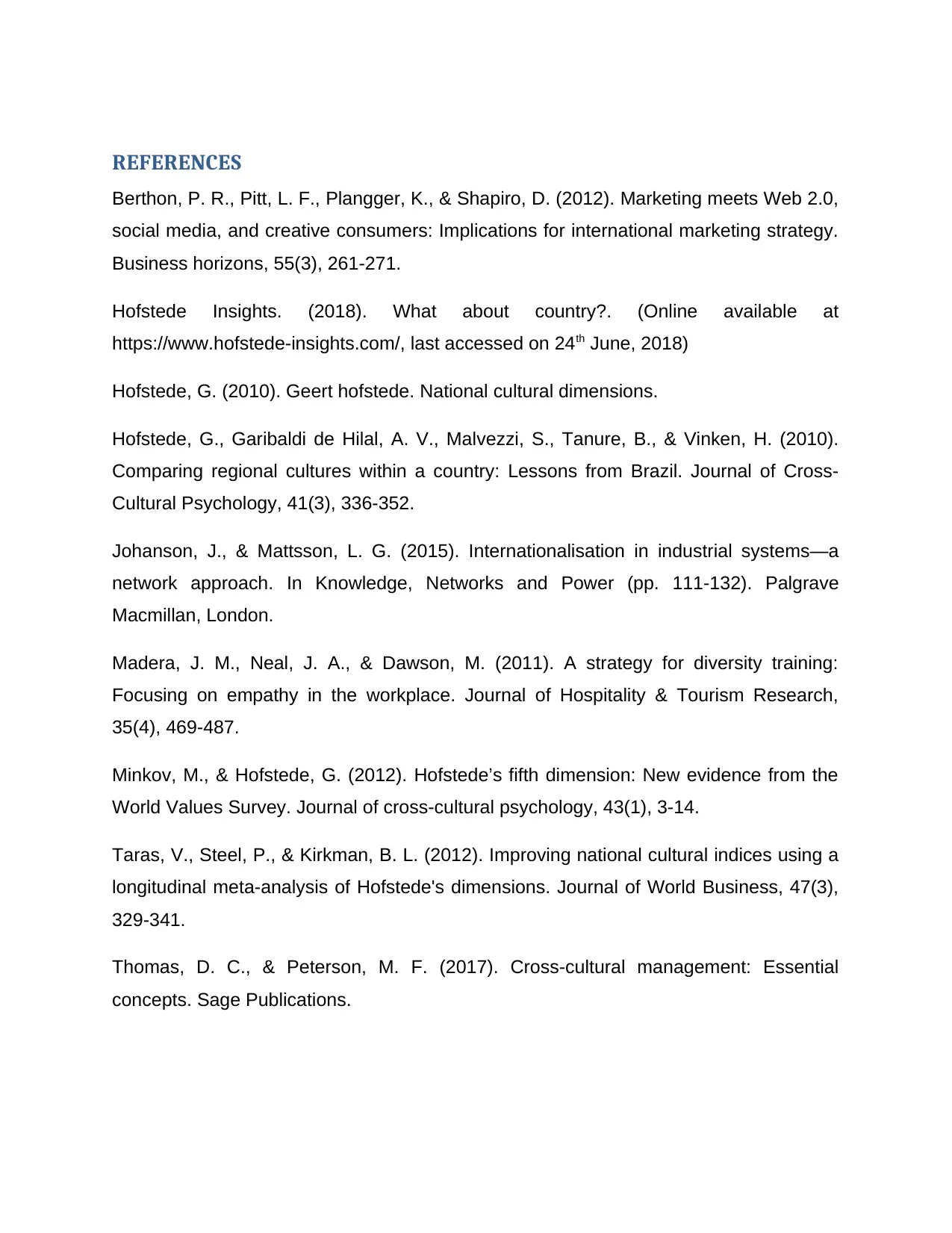
REFERENCES
Berthon, P. R., Pitt, L. F., Plangger, K., & Shapiro, D. (2012). Marketing meets Web 2.0,
social media, and creative consumers: Implications for international marketing strategy.
Business horizons, 55(3), 261-271.
Hofstede Insights. (2018). What about country?. (Online available at
https://www.hofstede-insights.com/, last accessed on 24th June, 2018)
Hofstede, G. (2010). Geert hofstede. National cultural dimensions.
Hofstede, G., Garibaldi de Hilal, A. V., Malvezzi, S., Tanure, B., & Vinken, H. (2010).
Comparing regional cultures within a country: Lessons from Brazil. Journal of Cross-
Cultural Psychology, 41(3), 336-352.
Johanson, J., & Mattsson, L. G. (2015). Internationalisation in industrial systems—a
network approach. In Knowledge, Networks and Power (pp. 111-132). Palgrave
Macmillan, London.
Madera, J. M., Neal, J. A., & Dawson, M. (2011). A strategy for diversity training:
Focusing on empathy in the workplace. Journal of Hospitality & Tourism Research,
35(4), 469-487.
Minkov, M., & Hofstede, G. (2012). Hofstede’s fifth dimension: New evidence from the
World Values Survey. Journal of cross-cultural psychology, 43(1), 3-14.
Taras, V., Steel, P., & Kirkman, B. L. (2012). Improving national cultural indices using a
longitudinal meta-analysis of Hofstede's dimensions. Journal of World Business, 47(3),
329-341.
Thomas, D. C., & Peterson, M. F. (2017). Cross-cultural management: Essential
concepts. Sage Publications.
Berthon, P. R., Pitt, L. F., Plangger, K., & Shapiro, D. (2012). Marketing meets Web 2.0,
social media, and creative consumers: Implications for international marketing strategy.
Business horizons, 55(3), 261-271.
Hofstede Insights. (2018). What about country?. (Online available at
https://www.hofstede-insights.com/, last accessed on 24th June, 2018)
Hofstede, G. (2010). Geert hofstede. National cultural dimensions.
Hofstede, G., Garibaldi de Hilal, A. V., Malvezzi, S., Tanure, B., & Vinken, H. (2010).
Comparing regional cultures within a country: Lessons from Brazil. Journal of Cross-
Cultural Psychology, 41(3), 336-352.
Johanson, J., & Mattsson, L. G. (2015). Internationalisation in industrial systems—a
network approach. In Knowledge, Networks and Power (pp. 111-132). Palgrave
Macmillan, London.
Madera, J. M., Neal, J. A., & Dawson, M. (2011). A strategy for diversity training:
Focusing on empathy in the workplace. Journal of Hospitality & Tourism Research,
35(4), 469-487.
Minkov, M., & Hofstede, G. (2012). Hofstede’s fifth dimension: New evidence from the
World Values Survey. Journal of cross-cultural psychology, 43(1), 3-14.
Taras, V., Steel, P., & Kirkman, B. L. (2012). Improving national cultural indices using a
longitudinal meta-analysis of Hofstede's dimensions. Journal of World Business, 47(3),
329-341.
Thomas, D. C., & Peterson, M. F. (2017). Cross-cultural management: Essential
concepts. Sage Publications.
⊘ This is a preview!⊘
Do you want full access?
Subscribe today to unlock all pages.

Trusted by 1+ million students worldwide
1 out of 13
Related Documents
Your All-in-One AI-Powered Toolkit for Academic Success.
+13062052269
info@desklib.com
Available 24*7 on WhatsApp / Email
![[object Object]](/_next/static/media/star-bottom.7253800d.svg)
Unlock your academic potential
Copyright © 2020–2025 A2Z Services. All Rights Reserved. Developed and managed by ZUCOL.





